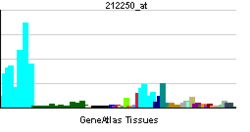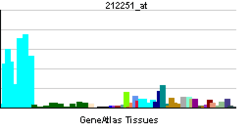MTDH
| View/Edit Human | View/Edit Mouse |
Metadherin, also known as protein LYRIC or astrocyte elevated gene-1 protein (AEG-1) is a protein that in humans is encoded by the MTDH gene.[3][4][5]
Function
AEG-1 is involved in HIF-1alpha mediated angiogenesis. AEG-1 also interacts with SND1 and involved in RNA-induced silencing complex (RISC) and plays very important role in RISC and miRNA functions.[6][7]
AEG-1 induces an oncogene called Late SV40 factor (LSF/TFCP2) which is involved in thymidylate synthase (TS) induction and DNA biosynthesis synthesis.[8] Late SV40 factor (LSF/TFCP2) enhances angiogenesis by transcriptionally up-regulating matrix metalloproteinase-9 (MMP9).[9]
Clinical significance
AEG-1 acts as an oncogene in melanoma, malignant glioma, breast cancer and hepatocellular carcinoma.[10] It is highly expressed in these cancers and helps in progression and development of these cancers. It is induced by c-Myc oncogene and plays very important role in anchorage independent growth of cancer cells.
Elevated expression of the metastasis gene metadherin (MTDH), which is overexpressed in more than 40% of breast cancers, is associated with poor clinical outcomes. MTDH has a dual role in promoting metastatic seeding and enhancing chemoresistance. MTDH is therefore a potential therapeutic target for enhancing chemotherapy and reducing metastasis.[11]
LSF/TFCP2 plays multifaceted role in chemo resistance, EMT, allergic response, inflammation and Alzheimer’s disease.[12]
AEG-1 controls many hallmarks of oncogenes and cancer. AEG-1/MTDH induces hepato steatosis in mouse liver.[13] The MTDH knockdown by artificial microRNA interference functions as a potential tumor suppressor in breast cancer.[14] Astrocyte elevated gene-1/MTDH undergoes palmitoylation in normal and abnormal physiology of the cell.[15]The microgrooved biomaterial titanium substrata can alter the expression of AEG-1 in human primary cells.[16]
References
- ↑ "Human PubMed Reference:".
- ↑ "Mouse PubMed Reference:".
- ↑ "Entrez Gene: MTDH metadherin".
- ↑ Brown DM, Ruoslahti E (Apr 2004). "Metadherin, a cell surface protein in breast tumors that mediates lung metastasis". Cancer Cell. 5 (4): 365–74. doi:10.1016/S1535-6108(04)00079-0. PMID 15093543.
- ↑ Sutherland HG, Lam YW, Briers S, Lamond AI, Bickmore WA (Mar 2004). "3D3/lyric: a novel transmembrane protein of the endoplasmic reticulum and nuclear envelope, which is also present in the nucleolus". Experimental Cell Research. 294 (1): 94–105. doi:10.1016/j.yexcr.2003.11.020. PMID 14980505.
- ↑ Yoo BK, Santhekadur PK, Gredler R, Chen D, Emdad L, Bhutia S, Pannell L, Fisher PB, Sarkar D (May 2011). "Increased RNA-induced silencing complex (RISC) activity contributes to hepatocellular carcinoma". Hepatology. 53 (5): 1538–48. doi:10.1002/hep.24216. PMC 3081619
 . PMID 21520169.
. PMID 21520169. - ↑ Yoo BK, Emdad L, Lee SG, Su ZZ, Santhekadur P, Chen D, Gredler R, Fisher PB, Sarkar D (Apr 2011). "Astrocyte elevated gene-1 (AEG-1): A multifunctional regulator of normal and abnormal physiology". Pharmacology & Therapeutics. 130 (1): 1–8. doi:10.1016/j.pharmthera.2011.01.008. PMC 3043119
 . PMID 21256156.
. PMID 21256156. - ↑ Yoo BK, Gredler R, Vozhilla N, Su ZZ, Chen D, Forcier T, Shah K, Saxena U, Hansen U, Fisher PB, Sarkar D (Aug 2009). "Identification of genes conferring resistance to 5-fluorouracil". Proceedings of the National Academy of Sciences of the United States of America. 106 (31): 12938–43. doi:10.1073/pnas.0901451106. PMC 2722317
 . PMID 19622726.
. PMID 19622726. - ↑ Santhekadur PK, Gredler R, Chen D, Siddiq A, Shen XN, Das SK, Emdad L, Fisher PB, Sarkar D (Jan 2012). "Late SV40 factor (LSF) enhances angiogenesis by transcriptionally up-regulating matrix metalloproteinase-9 (MMP-9)". The Journal of Biological Chemistry. 287 (5): 3425–32. doi:10.1074/jbc.M111.298976. PMC 3270996
 . PMID 22167195.
. PMID 22167195. - ↑ Yoo BK, Emdad L, Su ZZ, Villanueva A, Chiang DY, Mukhopadhyay ND, Mills AS, Waxman S, Fisher RA, Llovet JM, Fisher PB, Sarkar D (Mar 2009). "Astrocyte elevated gene-1 regulates hepatocellular carcinoma development and progression". The Journal of Clinical Investigation. 119 (3): 465–77. doi:10.1172/JCI36460. PMC 2648696
 . PMID 19221438.
. PMID 19221438. - ↑ Hu G, Chong RA, Yang Q, Wei Y, Blanco MA, Li F, Reiss M, Au JL, Haffty BG, Kang Y (Jan 2009). "MTDH activation by 8q22 genomic gain promotes chemoresistance and metastasis of poor-prognosis breast cancer". Cancer Cell. 15 (1): 9–20. doi:10.1016/j.ccr.2008.11.013. PMC 2676231
 . PMID 19111877.
. PMID 19111877. - ↑ Santhekadur PK, Rajasekaran D, Siddiq A, Gredler R, Chen D, Schaus SC, Hansen U, Fisher PB, Sarkar D (2012). "The transcription factor LSF: a novel oncogene for hepatocellular carcinoma" (PDF). Am J Cancer Res. 2 (3): 269–285.
- ↑ Srivastava J, Siddiq A, Emdad L, Santhekadur PK, Chen D, Gredler R, Shen XN, Robertson CL, Dumur CI, Hylemon PB, Mukhopadhyay ND, Bhere D, Shah K, Ahmad R, Giashuddin S, Stafflinger J, Subler MA, Windle JJ, Fisher PB, Sarkar D (Nov 2012). "Astrocyte elevated gene-1 promotes hepatocarcinogenesis: novel insights from a mouse model". Hepatology. 56 (5): 1782–91. doi:10.1002/hep.25868. PMID 22689379.
- ↑ Wang S, Shu JZ, Cai Y, Bao Z, Liang QM (2012). "Establishment and characterization of MTDH knockdown by artificial MicroRNA interference - functions as a potential tumor suppressor in breast cancer" (PDF). Asian Pacific Journal of Cancer Prevention. 13 (6): 2813–8. doi:10.7314/apjcp.2012.13.6.2813. PMID 22938464.
- ↑ Martin BR, Wang C, Adibekian A, Tully SE, Cravatt BF (Jan 2012). "Global profiling of dynamic protein palmitoylation". Nature Methods. 9 (1): 84–9. doi:10.1038/nmeth.1769. PMC 3248616
 . PMID 22056678.
. PMID 22056678. - ↑ Lee MH, Kang JH, Lee SW (Apr 2012). "The significance of differential expression of genes and proteins in human primary cells caused by microgrooved biomaterial substrata". Biomaterials. 33 (11): 3216–34. doi:10.1016/j.biomaterials.2012.01.034. PMID 22285466.
Further reading
- Emdad L, Sarkar D, Su ZZ, Lee SG, Kang DC, Bruce JN, Volsky DJ, Fisher PB (May 2007). "Astrocyte elevated gene-1: recent insights into a novel gene involved in tumor progression, metastasis and neurodegeneration". Pharmacology & Therapeutics. 114 (2): 155–70. doi:10.1016/j.pharmthera.2007.01.010. PMC 2039930
 . PMID 17397930.
. PMID 17397930. - van 't Veer LJ, Dai H, van de Vijver MJ, He YD, Hart AA, Mao M, Peterse HL, van der Kooy K, Marton MJ, Witteveen AT, Schreiber GJ, Kerkhoven RM, Roberts C, Linsley PS, Bernards R, Friend SH (Jan 2002). "Gene expression profiling predicts clinical outcome of breast cancer". Nature. 415 (6871): 530–6. doi:10.1038/415530a. PMID 11823860.
- Sutherland HG, Lam YW, Briers S, Lamond AI, Bickmore WA (Mar 2004). "3D3/lyric: a novel transmembrane protein of the endoplasmic reticulum and nuclear envelope, which is also present in the nucleolus". Experimental Cell Research. 294 (1): 94–105. doi:10.1016/j.yexcr.2003.11.020. PMID 14980505.
- Brown DM, Ruoslahti E (Apr 2004). "Metadherin, a cell surface protein in breast tumors that mediates lung metastasis". Cancer Cell. 5 (4): 365–74. doi:10.1016/S1535-6108(04)00079-0. PMID 15093543.
- Britt DE, Yang DF, Yang DQ, Flanagan D, Callanan H, Lim YP, Lin SH, Hixson DC (Oct 2004). "Identification of a novel protein, LYRIC, localized to tight junctions of polarized epithelial cells". Experimental Cell Research. 300 (1): 134–48. doi:10.1016/j.yexcr.2004.06.026. PMID 15383321.
- Kang DC, Su ZZ, Sarkar D, Emdad L, Volsky DJ, Fisher PB (Jun 2005). "Cloning and characterization of HIV-1-inducible astrocyte elevated gene-1, AEG-1". Gene. 353 (1): 8–15. doi:10.1016/j.gene.2005.04.006. PMID 15927426.
- Olsen JV, Blagoev B, Gnad F, Macek B, Kumar C, Mortensen P, Mann M (Nov 2006). "Global, in vivo, and site-specific phosphorylation dynamics in signaling networks". Cell. 127 (3): 635–48. doi:10.1016/j.cell.2006.09.026. PMID 17081983.
- Lee SG, Su ZZ, Emdad L, Sarkar D, Fisher PB (Nov 2006). "Astrocyte elevated gene-1 (AEG-1) is a target gene of oncogenic Ha-ras requiring phosphatidylinositol 3-kinase and c-Myc". Proceedings of the National Academy of Sciences of the United States of America. 103 (46): 17390–5. doi:10.1073/pnas.0608386103. PMC 1859939
 . PMID 17088530.
. PMID 17088530.

